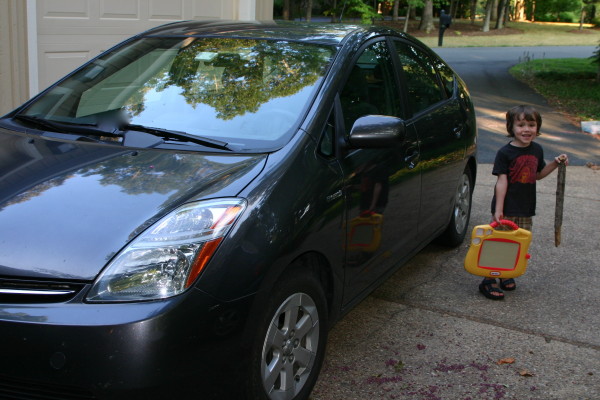I bought my Prius four years ago in an effort to be “green.” The Toyota Prius has become the status symbol of the green movement. I’m getting an amazing 44 miles per gallon. But is the Prius really green?

The first time I drove my car, I savored that new car smell. Even now, four years later, I can smell it, especially after a really hot day. I started to wonder exactly what that new car odor was. And then I really began to look at my car and took note of all of the plastic, the stain-resistant fabrics and carpet, the glue that holds it all together. It’s obvious that nothing in my car is natural.
According to the Environmental Working Group, the plastic, carpet and glue inside of my car are responsible for that new car smell. They off-gas volatile organic compounds (VOCs), such as benzene and formaldehyde. VOCs can be responsible for a whole range of illnesses, from headaches and nausea to cancer. Other toxins found in cars include toluene and xylene (linked to cancer, birth effects and reproductive effects), brominated flame retardants (linked to brain and nerve damage and to hormone disruption), and phthalates (linked to cancer and reproductive disorders).
In 2006, independent tests of the air quality of the Toyota Prius revealed over 60 airborne chemicals (as compared to 25 in the control test), including all of those mentioned above.
The harmful effects of the fumes in our cars are greatest when the car is new, and even worse on these hot summer days when the heat causes the toxins to be more volatile. The best thing you can do is to let the interior of your car air out as much as possible by opening windows. Cars are designed to be air-tight, which is great for improving gas mileage but essentially traps us in with these dangerous toxins.
While the risks decrease with time, the toxins that are used to make those comfy seats will always be there. I can still smell it in my car even after all of these years. My hope is that car manufacturers like Prius will get with the program and start limiting the amount of harmful chemicals they use in cars.
Until then, you can reduce your exposure to toxins in your car with these tips:
- Reduce the amount of time you spend in the car (which is good for the environment anyway).
- Keep your windows open as much as possible (except when driving in heavy traffic where the outside pollution might be even worse).
- Park in the shade or use a sun shield in your window to keep your car cooler.
- Avoid long trips in a new car.
- Don’t use artificial air fresheners.
- Choose natural cleaners when cleaning your car.
